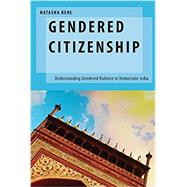Gendered Citizenship Understanding Gendered Violence in Democratic India
, by Behl, Natasha- ISBN: 9780197576908 | 0197576907
- Cover: Paperback
- Copyright: 3/1/2021
It has been shown time and again that even though all citizens may be accorded equal standing in the constitution of a liberal democracy, such a legal provision hardly guarantees state protections against discrimination and political exclusion. More specifically, why do we find pervasive gender-based discrimination, exclusion, and violence in India when the Indian Constitution supports an inclusive democracy committed to gender and caste equality?
In Gendered Citizenship, Natasha Behl offers an examination of Indian citizenship that weaves together an analysis of sexual violence law with an in-depth ethnography of the Sikh community to explore the contradictory nature of Indian democracy--which gravely affects its institutions and puts its citizens at risk. Through a situated analysis of citizenship, Behl upends longstanding academic assumptions about democracy, citizenship, religion, and gender. This analysis reveals that religious spaces and practices can be sites for renegotiating democratic participation, but also uncovers how some women engage in religious community in unexpected ways to link gender equality and religious freedom as shared goals. Gendered Citizenship is a groundbreaking inquiry that explains why the promise of democratic equality remains unrealized, and identifies potential spaces and practices that can create more egalitarian relations.
In Gendered Citizenship, Natasha Behl offers an examination of Indian citizenship that weaves together an analysis of sexual violence law with an in-depth ethnography of the Sikh community to explore the contradictory nature of Indian democracy--which gravely affects its institutions and puts its citizens at risk. Through a situated analysis of citizenship, Behl upends longstanding academic assumptions about democracy, citizenship, religion, and gender. This analysis reveals that religious spaces and practices can be sites for renegotiating democratic participation, but also uncovers how some women engage in religious community in unexpected ways to link gender equality and religious freedom as shared goals. Gendered Citizenship is a groundbreaking inquiry that explains why the promise of democratic equality remains unrealized, and identifies potential spaces and practices that can create more egalitarian relations.






